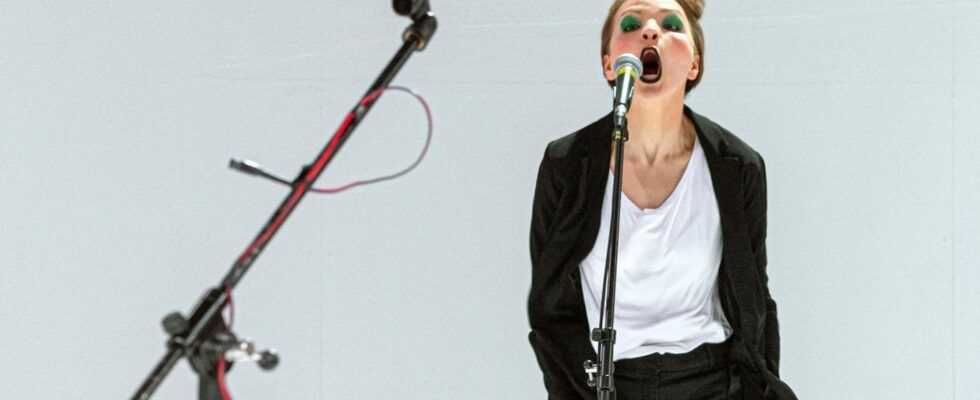Culture is seen as dispensable in times of crisis. The “Kunstnothilfe” sees it differently and supports musicians, newcomers and actors who have not been making any money for over a year.
They moaned and screamed. They sighed and cheered. They contorted on the floor and in front of the microphone. The theater was sold out, 150 people watched the three women on stage. They all came to see “We Can Do It Moaning”, a performance by the Aba Naia collective. Or simply: art.
The evening in February 2020 was the premiere of the piece – and at the same time the last performance. Shortly afterwards, the coronavirus reached Germany. The theaters had to close, concerts were canceled, and no one went to exhibitions or museums. Since then, Teija Vaittinen, 35, one of the women on stage from Finland has been out of work.
She had worked on the performance for three years with the other women in her collective, two months before the premiere they did nothing more than rehearse. For free. “Everything was simply canceled,” says Teija Vaittinen, “I was in a state of shock.” She earns money with her art, but that didn’t happen. And because “you can’t live easily just from performance,” she also worked as a theater and circus teacher. For example in schools. But the schools also closed. So what was left for her? She reports to the job center. Like many. She applies for emergency aid. But the wheels of the bureaucracy grind slowly. And the bills don’t wait.
At around the same time, Lukas Kunert, 30, is taking care of his children, who cannot go to kindergarten, and wonders who would be most in need of help in this crisis. And even if hardly anyone could foresee the extent at the time, he suspects: “People will find art most dispensable.”
Lukas Kunert is the founder of “Elinor”, a digital platform through which people can manage money together and democratically. For example, the climate activists from Fridays for Future, who have thus shared fines for striking students in solidarity. You should be able to get something going, he thinks, and calls his bank with the idea of helping artists.
The emergency aid helps – faster than others
They are not officially non-profit. That helps in the crisis: “We were able to react much faster because we are giving away gifts,” explains Lukas Kunert. No complex means test, no well-founded promotion of exceptional talent. “How are people supposed to prove their need? Until recently they weren’t poor,” says Kunert, describing the problem that prevailed everywhere at the beginning of the crisis.
In spring 2020 they created a council of seven people who work as gallery owners, actors or visual artists themselves and who are allowed to give away the money. “We phoned all of our networks and told them about ‘KunstNothilfe’,” says Kunert. Artists started actions for the “emergency aid”. The team of the ARD series “Ausgebremst” donated their fees, writers waived their book royalties and artists donated their works for auction. In just five weeks they got together 100,000 euros, which they gave away.
Lukas Kunert is part of the council that decides who gets the money. What do people write? “It goes from the mother with three children, whose aids have been used up, to the man who needs money for the heating bill.” Each council member receives a batch of applications and decides alone. “We don’t want to balance hardship against each other,” says Kunert. When the council meets and everyone introduces who should get the money, they often find that this time one is mainly promoting new artists, one is mainly musicians, someone else is promoting families. So far they have been able to help over 500 people. At least – or only: they have to reject four out of five applications. “We’re just a drop in the ocean,” says Kunert. “And yet we are needed.”
In October they almost had the hope that things would go on again without them. When it seemed for at least a couple of weeks that everything was slowly starting to normal. But the euphoria didn’t last long. Because then suddenly more applications came in again. They start new promotions to raise new money. Musicians always open their windows on Thursdays and give a small concert, so people become aware of the “emergency aid”. “We see people’s financial cycles: at the moment, many seem to have to pay for their insurance.”
Teija Vaittinen is one of the lucky ones who are supported by “KunstNothilfe”. Friends had told her about it. “As an artist, you’re used to being forgotten,” she says. She wrote an application; after all, she had nothing to lose. “When the word came that I was getting help, I was finally able to breathe again. I thought: Maybe it will work somehow.” She now gets 500 euros per month. That’s enough for now. And then she still receives emergency state aid. Because it will probably take a while until she can finally work fully again.
The collective is now rehearsing digitally for a new project that is about failure, only sometimes the women see each other personally. You do a lot of paperwork: you apply for festivals, for scholarships, for other grants. Maybe they moan sometimes. But not because of the art.
